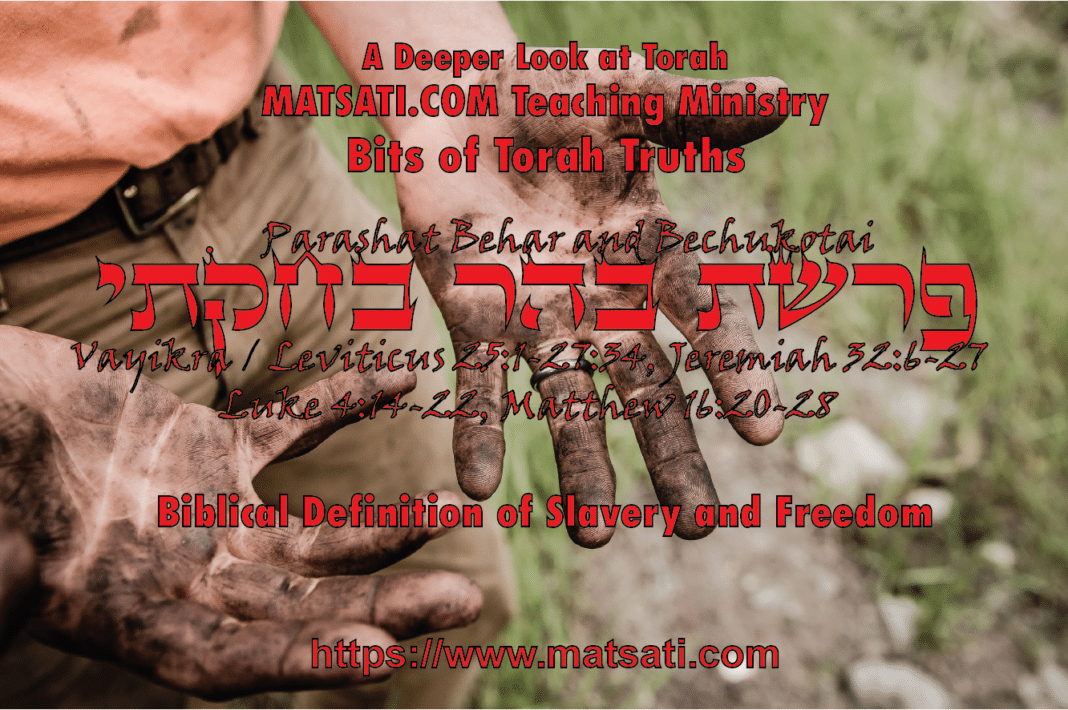This week’s Torah Portion reveals to us God’s desire for redemption of His people. Redemption is not just about people, redemption also applies to home and Land. The point of these things are related to whether a man becomes poor and must sell his home, property, or himself in order to pay his debts. In the Torah God sanctions slavery for this specific purpose, to get out of debt, and the Torah explains that a slave must be treated as if he is a hired worker, and so the biblical definition of slavery has nothing to do with the inhuman treatment of another human being. Most people who criticize the Torah in this regard attempt to emphasize a non-biblical perspective in an attempt to get others to follow their sentiments. However, in the Torah and all of Scripture we read how God wants salvation, deliverance, redemption, and freedom for His people! In this week’s Torah portion we learn how the Lord provides a way for us to redeem that which was sold according to Vayikra / Leviticus 25:23–24, וְהָאָ֗רֶץ לֹ֤א תִמָּכֵר֙ לִצְמִתֻ֔ת כִּי־לִ֖י הָאָ֑רֶץ כִּֽי־גֵרִ֧ים וְתוֹשָׁבִ֛ים אַתֶּ֖ם עִמָּדִֽי׃ וּבְכֹ֖ל אֶ֣רֶץ אֲחֻזַּתְכֶ֑ם גְּאֻלָּ֖ה תִּתְּנ֥וּ לָאָֽרֶץ׃ 25:23 “The land shall not be sold in perpetuity, for the land is mine. For you are strangers and sojourners with me. 25:24 And in all the country you possess, you shall allow a redemption of the land. (ESV) Based upon the reading, the text states, וְהָאָ֗רֶץ לֹ֤א תִמָּכֵר֙ לִצְמִתֻ֔ת “the land is not to be sold permanently” and the reason given is כִּי־לִ֖י הָאָ֑רֶץ כִּֽי־גֵרִ֧ים וְתוֹשָׁבִ֛ים אַתֶּ֖ם עִמָּדִֽי “because the land is mine and you are gerim toshavim you with me.” Do you notice how significant this statement is? The Ger toshav (גר תושב) is an extremely loaded couple of words where ger means “foreigner” or “alien” and toshav which means “resident,” therefore this phrase means “resident alien” written in plural form as God is referring to both all of Israel and Himself. Do you notice how significant these words are? This is a halakhic term used in Judaism to designate the legal status of a Gentile (non-Jew) living in the Land of Israel. The reason this is so significant is how God is calling both Himself and all of Israel גֵרִ֧ים וְתוֹשָׁבִ֛ים (gerim toshavim). This statement is as a gentile wanting to convert to Judaism and it is quite fascinating how this is being used here in the Hebrew text. These words express the desire for something greater, aspiring for a truth that has been revealed from God, and expresses the desire of one who has not known God wanting to enter into the presence of God and to walk in His ways. This is the condition that we all find ourselves in this wicked world as being citizens of heaven through faith in Yeshua the Messiah. Note what Ibn Ezra has to say concerning this verse.
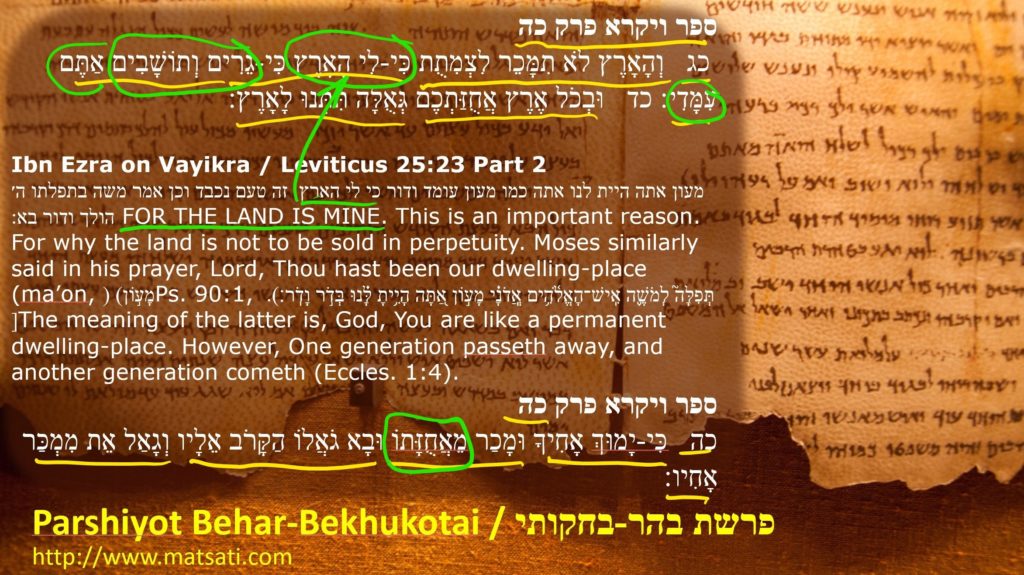
Ibn Ezra on Vayikra / Leviticus 25:23 Part 2
כי לי הארץ. זה טעם נכבד וכן אמר משה בתפלתו ה׳ מעון אתה היית לנו אתה כמו מעון עומד ודור הולך ודור בא:
FOR THE LAND IS MINE. This is an important reason. For why the land is not to be sold in perpetuity. Moses similarly said in his prayer, Lord, Thou hast been our dwelling-place (ma’on, מָע֣וֹן) (Ps. 90:1, תְּפִלָּה֮ לְמֹשֶׁ֪ה אִֽישׁ־הָאֱלֹ֫הִ֥ים אֲֽדֹנָ֗י מָע֣וֹן אַ֭תָּה הָיִ֥יתָ לָּ֗נוּ בְּדֹ֣ר וָדֹֽר׃). [The meaning of the latter is, God, You are like a permanent dwelling-place. However, One generation passeth away, and another generation cometh (Eccles. 1:4).
The reason the Land was not to be permanently sold was due to God being our dwelling place how this is a permanent aspect of our lives, and the connection to the gift of personal property, liberty, and freedoms as owning land. But not just this we also read the text states,כִּי־לִ֖י הָאָרֶץ (“because this is my Land”) the Land belongs to God. So when the Land is sold due to poverty, the one who has to give back the land is also reminded that all things belong to God, even our livelihood, therefore one shouldn’t be grieved in returning the land to its original owner. (Rabbeinu Bahya, Vayikra / Leviticus 25.23 Part 2)
We continue reading in the Torah the following, Vayikra / Leviticus 25:25 כִּֽי־יָמ֣וּךְ אָחִ֔יךָ וּמָכַ֖ר מֵאֲחֻזָּת֑וֹ וּבָ֤א גֹֽאֲלוֹ֙ הַקָּרֹ֣ב אֵלָ֔יו וְגָאַ֕ל אֵ֖ת מִמְכַּ֥ר אָחִֽיו׃ ‘If a fellow countryman of yours becomes so poor that he sells part of his property, then his closest redeemer is to come and buy back what his relative has sold. (NASB) This verse speaks about a fellow brother (אָחִ֔יךָ) having to sell himself into slavery we are provided with a future expectation of the Redeemer as the text states וּבָ֤א גֹֽאֲלוֹ֙ “and his redeemer comes,” this is a reference to the Lord God Almighty who is our Redeemer, as the Torah states, אֲשֶׁר־ל֥וֹ אֱלֹהִ֖ים קְרֹבִ֣ים אֵלָ֑יו “who has the Lord near to him” (Devarim / Deuteronomy 4:7) where Moshe writes that the Lord is always near His People. Notice the nearness of God is part of the Gospel Message, and the kinsman Redeemer is also a part of the Gospel Message. These things remind us of how in our most desperate situations, such as in the case of having to be sold into slavery to get out of debt, we are given a promise that we have our Father in heaven and His Messiah Yeshua who are able to deliver us and therefore there is always hope!
The Scriptures that we are looking at for this week are from Vayikra / Leviticus 25:25-55.
ספר ויקרא פרק כה
כה כִּי-יָמוּךְ אָחִיךָ וּמָכַר מֵאֲחֻזָּתוֹ וּבָא גֹאֲלוֹ הַקָּרֹב אֵלָיו וְגָאַל אֵת מִמְכַּר אָחִיו: כו וְאִישׁ כִּי לֹא יִהְיֶה-לּוֹ גֹּאֵל וְהִשִּׂיגָה יָדוֹ וּמָצָא כְּדֵי גְאֻלָּתוֹ: כז וְחִשַּׁב אֶת-שְׁנֵי מִמְכָּרוֹ וְהֵשִׁיב אֶת-הָעֹדֵף לָאִישׁ אֲשֶׁר מָכַר-לוֹ וְשָׁב לַאֲחֻזָּתוֹ: כח וְאִם לֹא-מָצְאָה יָדוֹ דֵּי הָשִׁיב לוֹ וְהָיָה מִמְכָּרוֹ בְּיַד הַקֹּנֶה אֹתוֹ עַד שְׁנַת הַיּוֹבֵל וְיָצָא בַּיֹּבֵל וְשָׁב לַאֲחֻזָּתוֹ: ס [חמישי] [שלישי כשהן מחוברין] כט וְאִישׁ כִּי-יִמְכֹּר בֵּית-מוֹשַׁב עִיר חוֹמָה וְהָיְתָה גְּאֻלָּתוֹ עַד-תֹּם שְׁנַת מִמְכָּרוֹ יָמִים תִּהְיֶה גְאֻלָּתוֹ: ל וְאִם לֹא-יִגָּאֵל עַד-מְלֹאת לוֹ שָׁנָה תְמִימָה וְקָם הַבַּיִת אֲשֶׁר-בָּעִיר אֲשֶׁר-לֹא [לוֹ] חֹמָה לַצְּמִיתֻת לַקֹּנֶה אֹתוֹ לְדֹרֹתָיו לֹא יֵצֵא בַּיֹּבֵל: לא וּבָתֵּי הַחֲצֵרִים אֲשֶׁר אֵין-לָהֶם חֹמָה סָבִיב עַל-שְֹדֵה הָאָרֶץ יֵחָשֵׁב גְּאֻלָּה תִּהְיֶה-לּוֹ וּבַיֹּבֵל יֵצֵא: לב וְעָרֵי הַלְוִיִּם בָּתֵּי עָרֵי אֲחֻזָּתָם גְּאֻלַּת עוֹלָם תִּהְיֶה לַלְוִיִּם: לג וַאֲשֶׁר יִגְאַל מִן-הַלְוִיִּם וְיָצָא מִמְכַּר-בַּיִת וְעִיר אֲחֻזָּתוֹ בַּיֹּבֵל כִּי בָתֵּי עָרֵי הַלְוִיִּם הִוא אֲחֻזָּתָם בְּתוֹךְ בְּנֵי יִשְֹרָאֵל: לד וּשֲֹדֵה מִגְרַשׁ עָרֵיהֶם לֹא יִמָּכֵר כִּי-אֲחֻזַּת עוֹלָם הוּא לָהֶם: ס לה וְכִי-יָמוּךְ אָחִיךָ וּמָטָה יָדוֹ עִמָּךְ וְהֶחֱזַקְתָּ בּוֹ גֵּר וְתוֹשָׁב וָחַי עִמָּךְ: לו אַל-תִּקַּח מֵאִתּוֹ נֶשֶׁךְ וְתַרְבִּית וְיָרֵאתָ מֵאֱלֹהֶיךָ וְחֵי אָחִיךָ עִמָּךְ: לז אֶת-כַּסְפְּךָ לֹא-תִתֵּן לוֹ בְּנֶשֶׁךְ וּבְמַרְבִּית לֹא-תִתֵּן אָכְלֶךָ: לח אֲנִי יְהוָֹה אֱלֹהֵיכֶם אֲשֶׁר-הוֹצֵאתִי אֶתְכֶם מֵאֶרֶץ מִצְרָיִם לָתֵת לָכֶם אֶת-אֶרֶץ כְּנַעַן לִהְיוֹת לָכֶם לֵאלֹהִים: ס [ששי] [רביעי כשהן מחוברין] לט וְכִי-יָמוּךְ אָחִיךָ עִמָּךְ וְנִמְכַּר-לָךְ לֹא-תַעֲבֹד בּוֹ עֲבֹדַת עָבֶד: מ כְּשָֹכִיר כְּתוֹשָׁב יִהְיֶה עִמָּךְ עַד-שְׁנַת הַיֹּבֵל יַעֲבֹד עִמָּךְ: מא וְיָצָא מֵעִמָּךְ הוּא וּבָנָיו עִמּוֹ וְשָׁב אֶל-מִשְׁפַּחְתּוֹ וְאֶל-אֲחֻזַּת אֲבֹתָיו יָשׁוּב: מב כִּי-עֲבָדַי הֵם אֲשֶׁר-הוֹצֵאתִי אֹתָם מֵאֶרֶץ מִצְרָיִם לֹא יִמָּכְרוּ מִמְכֶּרֶת עָבֶד: מג לֹא-תִרְדֶּה בוֹ בְּפָרֶךְ וְיָרֵאתָ מֵאֱלֹהֶיךָ: מד וְעַבְדְּךָ וַאֲמָתְךָ אֲשֶׁר יִהְיוּ-לָךְ מֵאֵת הַגּוֹיִם אֲשֶׁר סְבִיבֹתֵיכֶם מֵהֶם תִּקְנוּ עֶבֶד וְאָמָה: מה וְגַם מִבְּנֵי הַתּוֹשָׁבִים הַגָּרִים עִמָּכֶם מֵהֶם תִּקְנוּ וּמִמִּשְׁפַּחְתָּם אֲשֶׁר עִמָּכֶם אֲשֶׁר הוֹלִידוּ בְּאַרְצְכֶם וְהָיוּ לָכֶם לַאֲחֻזָּה: מו וְהִתְנַחַלְתֶּם אֹתָם לִבְנֵיכֶם אַחֲרֵיכֶם לָרֶשֶׁת אֲחֻזָּה לְעֹלָם בָּהֶם תַּעֲבֹדוּ וּבְאַחֵיכֶם בְּנֵי-יִשְֹרָאֵל אִישׁ בְּאָחִיו לֹא-תִרְדֶּה בוֹ בְּפָרֶךְ: ס [שביעי] מז וְכִי תַשִּׂיג יַד גֵּר וְתוֹשָׁב עִמָּךְ וּמָךְ אָחִיךָ עִמּוֹ וְנִמְכַּר לְגֵר תּוֹשָׁב עִמָּךְ אוֹ לְעֵקֶר מִשְׁפַּחַת גֵּר: מח אַחֲרֵי נִמְכַּר גְּאֻלָּה תִּהְיֶה-לּוֹ אֶחָד מֵאֶחָיו יִגְאָלֶנּוּ: מט אוֹ-דֹדוֹ אוֹ בֶן-דֹּדוֹ יִגְאָלֶנּוּ אוֹ-מִשְּׁאֵר בְּשָֹרוֹ מִמִּשְׁפַּחְתּוֹ יִגְאָלֶנּוּ אוֹ-הִשִּׂיגָה יָדוֹ וְנִגְאָל: נ וְחִשַּׁב עִם-קֹנֵהוּ מִשְּׁנַת הִמָּכְרוֹ לוֹ עַד שְׁנַת הַיֹּבֵל וְהָיָה כֶּסֶף מִמְכָּרוֹ בְּמִסְפַּר שָׁנִים כִּימֵי שָֹכִיר יִהְיֶה עִמּוֹ: נא אִם-עוֹד רַבּוֹת בַּשָּׁנִים לְפִיהֶן יָשִׁיב גְּאֻלָּתוֹ מִכֶּסֶף מִקְנָתוֹ: נב וְאִם-מְעַט נִשְׁאַר בַּשָּׁנִים עַד-שְׁנַת הַיֹּבֵל וְחִשַּׁב-לוֹ כְּפִי שָׁנָיו יָשִׁיב אֶת-גְּאֻלָּתוֹ: נג כִּשְֹכִיר שָׁנָה בְּשָׁנָה יִהְיֶה עִמּוֹ לֹא-יִרְדֶּנּוּ בְּפֶרֶךְ לְעֵינֶיךָ: נד וְאִם-לֹא יִגָּאֵל בְּאֵלֶּה וְיָצָא בִּשְׁנַת הַיֹּבֵל הוּא וּבָנָיו עִמּוֹ: [מפטיר] נה כִּי-לִי בְנֵי-יִשְֹרָאֵל עֲבָדִים עֲבָדַי הֵם אֲשֶׁר-הוֹצֵאתִי אוֹתָם מֵאֶרֶץ מִצְרָיִם אֲנִי יְהוָֹה אֱלֹהֵיכֶם:
Vayikra / Leviticus 25:25-55
25:35 ‘Now in case a countryman of yours becomes poor and his means with regard to you falter, then you are to sustain him, like a stranger or a sojourner, that he may live with you. 25:36 ‘Do not take usurious interest from him, but revere your God, that your countryman may live with you. 25:37 ‘You shall not give him your silver at interest, nor your food for gain. 25:38 ‘I am the Lord your God, who brought you out of the land of Egypt to give you the land of Canaan and to be your God. 25:39 ‘If a countryman of yours becomes so poor with regard to you that he sells himself to you, you shall not subject him to a slave’s service. 25:40 ‘He shall be with you as a hired man, as if he were a sojourner; he shall serve with you until the year of jubilee. 25:41 ‘He shall then go out from you, he and his sons with him, and shall go back to his family, that he may return to the property of his forefathers. 25:42 ‘For they are My servants whom I brought out from the land of Egypt; they are not to be sold in a slave sale. 25:43 ‘You shall not rule over him with severity, but are to revere your God. 25:44 ‘As for your male and female slaves whom you may have you may acquire male and female slaves from the pagan nations that are around you. 25:45 ‘Then, too, it is out of the sons of the sojourners who live as aliens among you that you may gain acquisition, and out of their families who are with you, whom they will have produced in your land; they also may become your possession. 25:46 ‘You may even bequeath them to your sons after you, to receive as a possession; you can use them as permanent slaves. But in respect to your countrymen, the sons of Israel, you shall not rule with severity over one another. 25:47 ‘Now if the means of a stranger or of a sojourner with you becomes sufficient, and a countryman of yours becomes so poor with regard to him as to sell himself to a stranger who is sojourning with you, or to the descendants of a stranger’s family, 25:48 then he shall have redemption right after he has been sold. One of his brothers may redeem him, 25:49 or his uncle, or his uncle’s son, may redeem him, or one of his blood relatives from his family may redeem him; or if he prospers, he may redeem himself. 25:50 ‘He then with his purchaser shall calculate from the year when he sold himself to him up to the year of jubilee; and the price of his sale shall correspond to the number of years. It is like the days of a hired man that he shall be with him. 25:51 ‘If there are still many years, he shall refund part of his purchase price in proportion to them for his own redemption; 25:52 and if few years remain until the year of jubilee, he shall so calculate with him. In proportion to his years he is to refund the amount for his redemption. 25:53 ‘Like a man hired year by year he shall be with him; he shall not rule over him with severity in your sight. 25:54 ‘Even if he is not redeemed by these means, he shall still go out in the year of jubilee, he and his sons with him. 25:55 ‘For the sons of Israel are My servants; they are My servants whom I brought out from the land of Egypt. I am the Lord your God. (NASB)
In Hebrew the word for kinsman Redeemer is goel hadam (גֹּאֵ֣ל הַדָּ֔ם), the blood redeemer. As the name implies, and the text states (וּבָ֤א גֹֽאֲלוֹ֙ הַקָּרֹ֣ב אֵלָ֔יו) the kinsman is a family relative. Usually the next of kin if a brother or someone from the immediate family cannot do it. According to the dictionary a redeemer is someone who buys, purchases back, recovers, pays off or exchanges something for goods. From a biblical perspective the kinsman Redeemer is one who is charged with the duty of restoring or recovering the rights of another and avenging any wrongs that have been done. The Torah describes the redeemer as having two responsibilities, (i) to redeem family member or his property that had changed ownership and (ii) as in the case of Ruth, to Mary a widow who has no children and raise children in the name of the dead husband. We note the significance of the redeemer being both a near relative, and of God also being our redeemer, these things draw a connection to the creation account according to Bereshit / Genesis 1:26.
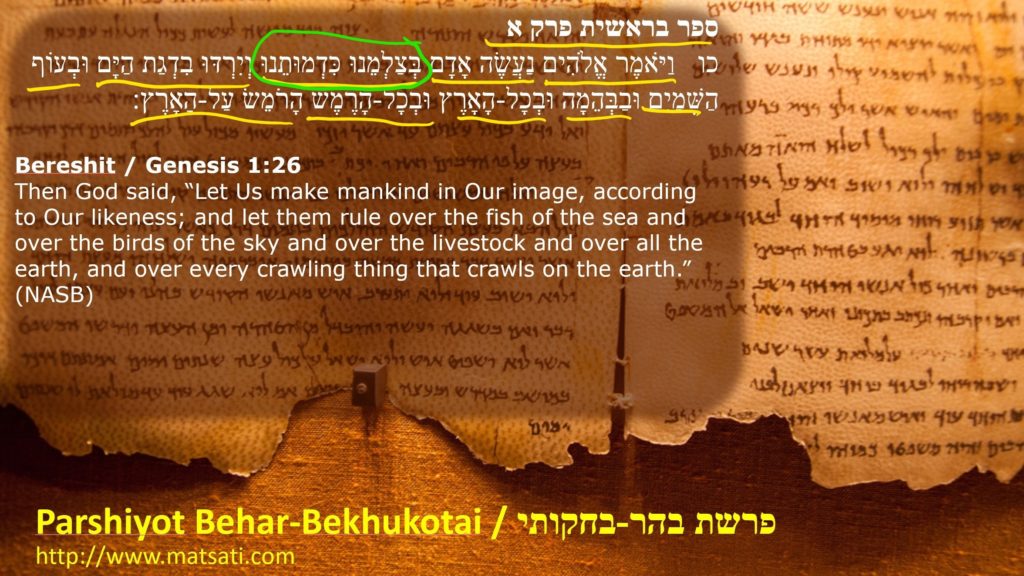
ספר בראשית פרק א
כו וַיֹּאמֶר אֱלֹהִים נַעֲשֶֹה אָדָם בְּצַלְמֵנוּ כִּדְמוּתֵנוּ וְיִרְדּוּ בִדְגַת הַיָּם וּבְעוֹף הַשָּׁמַיִם וּבַבְּהֵמָה וּבְכָל-הָאָרֶץ וּבְכָל-הָרֶמֶשֹ הָרֹמֵשֹ עַל-הָאָרֶץ:
Bereshit / Genesis 1:26
Then God said, “Let Us make mankind in Our image, according to Our likeness; and let them rule over the fish of the sea and over the birds of the sky and over the livestock and over all the earth, and over every crawling thing that crawls on the earth.” (NASB)
The Torah states that God made man בְּצַלְמֵנוּ כִּדְמוּתֵנוּ “in our image according to our likeness.” This reveals to us how precious each and every one of us are to God and how unique and holy, and valuable we are. The Jewish sages at times attempt to protect us from anthropomorphisms so that we do not create God in our image or likeness. Rashi writes that being created in God’s image meant that humans possess quality of understanding and discernment; Nachmonides explained it by saying that just as God was immortal, so was the human soul, and so on. The point of these things as being related to this week’s Torah portion is as having a Torah based reason for God sending His Son Yeshua to be our savior and redeemer. God was functioning in this capacity as sending one who was close to us, creating a redeemer in the likeness of man so that man could be purchased back and redeemed!
These things have a great application for our lives today. We note from a physical aspect here on earth, various peoples are at various states of wealth and debt. As we stand before God on a spiritual level, we are in great debt due to sin and have zero wealth outside of what the Messiah has done. Because we are human, we are quite capable of deceiving ourselves in many ways. For example, it is possible to believe we are behaving in a godly manner before God and others. Taking this approach, perhaps the meaning of being created in God’s image בְּצַלְמֵנוּ כִּדְמוּתֵנוּ has to do not so much with how we see ourselves, but how we choose to see and respond to others. Note how we were created to show mercy, and love and kindness to others. This idea of redemption is coupled to this truth of being created in the image of God. We have to realize it wasn’t just us who were created in this way, our neighbor was also created in the image of God, regardless of his or her gender, race, looks, political outlook, and social standing. This is the meaning of God being no respecter of persons, and when we do this we are able to abided more freely in the truth of who we are, and who others are as being created in God’s image. This also reveals to us how we are to behave towards others in mercy, truth, and justice.
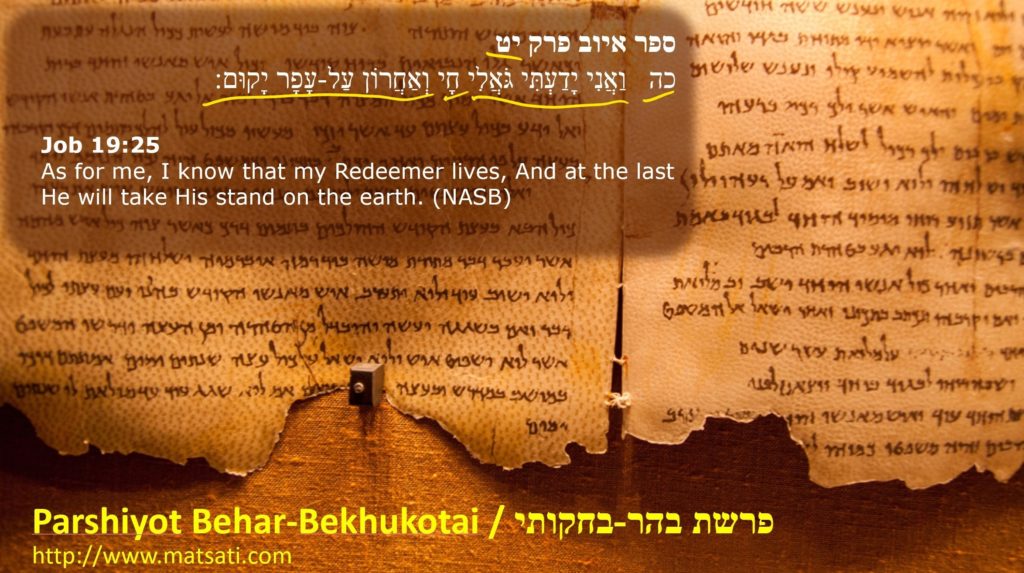
Job wrote the following according to Job 19:25:
ספר איוב פרק יט
כה וַאֲנִי יָדַעְתִּי גֹּאֲלִי חָי וְאַחֲרוֹן עַל-עָפָר יָקוּם: כו וְאַחַר עוֹרִי נִקְּפוּ-זֹאת וּמִבְּשָֹרִי אֶחֱזֶה אֱלוֹהַּ:
Job 19:25
As for me, I know that my Redeemer lives, And at the last He will take His stand on the earth. (NASB)
Here Job proclaimed knowing that his redeemer lives and will stand in the last days on the earth. Job had a future expectation of the Messiah! Based upon the Scriptures, the root for the word goel (גֹּאֵ֣ל) is used in specific situations regarding the things a righteous man would do for his brother (near-kinsman).
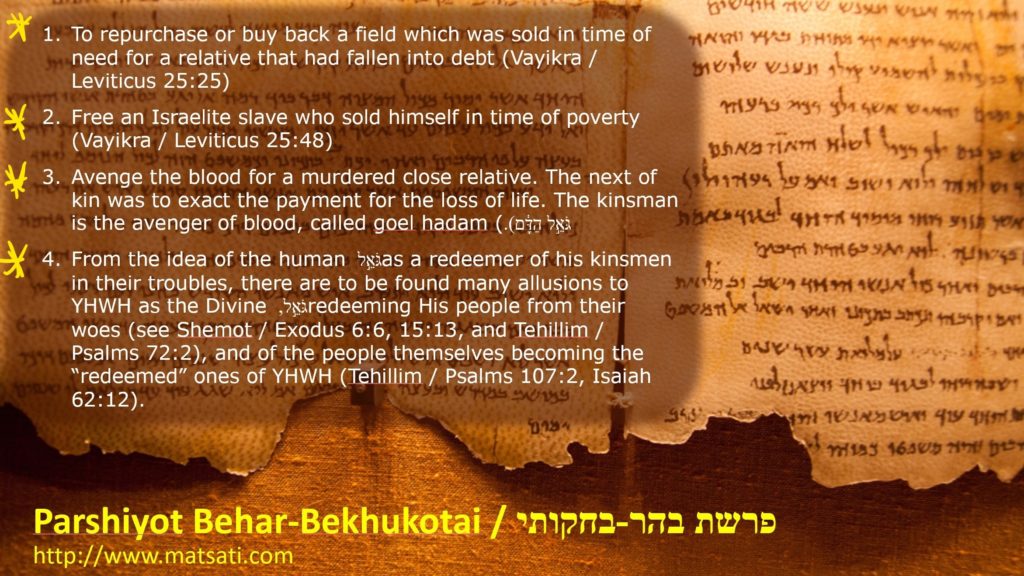
- To repurchase or buy back a field which was sold in time of need for a relative that had fallen into debt (Vayikra / Leviticus 25:25)
- Free an Israelite slave who sold himself in time of poverty (Vayikra / Leviticus 25:48)
- Avenge the blood for a murdered close relative. The next of kin was to exact the payment for the loss of life. The kinsman is the avenger of blood, called goel hadam (גֹּאֵ֣ל הַדָּ֔ם).
- From the idea of the human גֹּאֵ֣ל as a redeemer of his kinsmen in their troubles, there are to be found many allusions to YHWH as the Divine גֹּאֵ֣ל, redeeming His people from their woes (see Shemot / Exodus 6:6, 15:13, and Tehillim / Psalms 72:2), and of the people themselves becoming the “redeemed” ones of YHWH (Tehillim / Psalms 107:2, Isaiah 62:12).
We read in the Tanach (from the Psalms and the Prophets) how God is described as Israel’s redeemer who will stand with His people and vindicate them setting them free from servitude. God Himself is considered as being “near kin” (וּבָ֤א גֹֽאֲלוֹ֙ הַקָּרֹ֣ב אֵלָ֔יו) and so we get the expectation of God working in our lives in a very powerful way. Because God is considered owner of His people, He is the only one who is qualified to provide a redemption price (a ransom) as our redeemer (See Isaiah 43:1-3). King David wrote in the Psalms saying, “Let the words of my mouth, and the meditation of my heart, be acceptable in thy sight, O LORD my Rock and my Redeemer” (Tehillim / Psalm 19:14/15, יִֽהְי֥וּ לְרָצ֨וֹן׀ אִמְרֵי־פִ֡י וְהֶגְי֣וֹן לִבִּ֣י לְפָנֶ֑יךָ יְ֝הוָ֗ה צוּרִ֥י וְגֹאֲלִֽי׃) This draws in the concept of repentance, coupled to our redeemer and savior, as God’s Word is hidden in our hearts, we must therefore be careful how we esteem others. Take for example what Yeshua said in Matthew 7:3-5, how when we judge others (in any matter, specifically here in terms of wealth) we open our selves to reciprocal judgment. The idea is that we are to be humble before both God and man, helping our fellow man when he is in need and not simply condemning him or her in our hearts. Remember also how the thoughts of one’s heart define the course of one’s life. This is what Solomon wrote according to Mishley / Proverbs 4:24 states, “more than all else, guard your heart, because from it are the bounds of your life.” In addition to these things, Yeshua spoke of both the “good and evil treasures of the heart” which is the wellspring of our actions that are expressed in our words (Luke 6:45). The focus here is on the motivation of our hearts which govern the words that come forth. This is why David wrote what he did saying, “Let the words of my mouth, and the meditation of my heart, be acceptable in thy sight, O LORD my Rock and my Redeemer.”
According to Isaiah 44:21-23, the earth, the mountains, and the trees of the Land rejoice, they shout out because God is our redeemer.
ספר ישעיה פרק מד
כא זְכָר-אֵלֶּה יַעֲקֹב וְיִשְֹרָאֵל כִּי עַבְדִּי-אָתָּה יְצַרְתִּיךָ עֶבֶד-לִי אַתָּה יִשְֹרָאֵל לֹא תִנָּשֵׁנִי: כב מָחִיתִי כָעָב פְּשָׁעֶיךָ וְכֶעָנָן חַטֹּאותֶיךָ שׁוּבָה אֵלַי כִּי גְאַלְתִּיךָ: כג רָנּוּ שָׁמַיִם כִּי-עָשָֹה יְהֹוָה הָרִיעוּ תַּחְתִּיּוֹת אָרֶץ פִּצְחוּ הָרִים רִנָּה יַעַר וְכָל-עֵץ בּוֹ כִּי-גָאַל יְהֹוָה יַעֲקֹב וּבְיִשְֹרָאֵל יִתְפָּאָר:
Isaiah 44:21-23
44:21 ‘Remember these things, O Jacob, And Israel, for you are My servant; I have formed you, you are My servant, O Israel, you will not be forgotten by Me. 44:22 ‘I have wiped out your transgressions like a thick cloud And your sins like a heavy mist. Return to Me, for I have redeemed you.’ 44:23 Shout for joy, O heavens, for the Lord has done it! Shout joyfully, you lower parts of the earth; Break forth into a shout of joy, you mountains, O forest, and every tree in it; For the Lord has redeemed Jacob And in Israel He shows forth His glory. (NASB)
God is giving us a promise within Isaiah’s prophecy that He will not forget us! Notice how this connects back to what we are studying here, redemption is not just about people, but also our Home and Land as well. Here Isaiah speaks of how God will wipe away our transgressions if we repent and note the reason given is that God is our redeemer (שׁוּבָה אֵלַי כִּי גְאַלְתִּיךָ). Isaiah calls out to creation to shout out for joy due to the Lord as having redeemed His people!
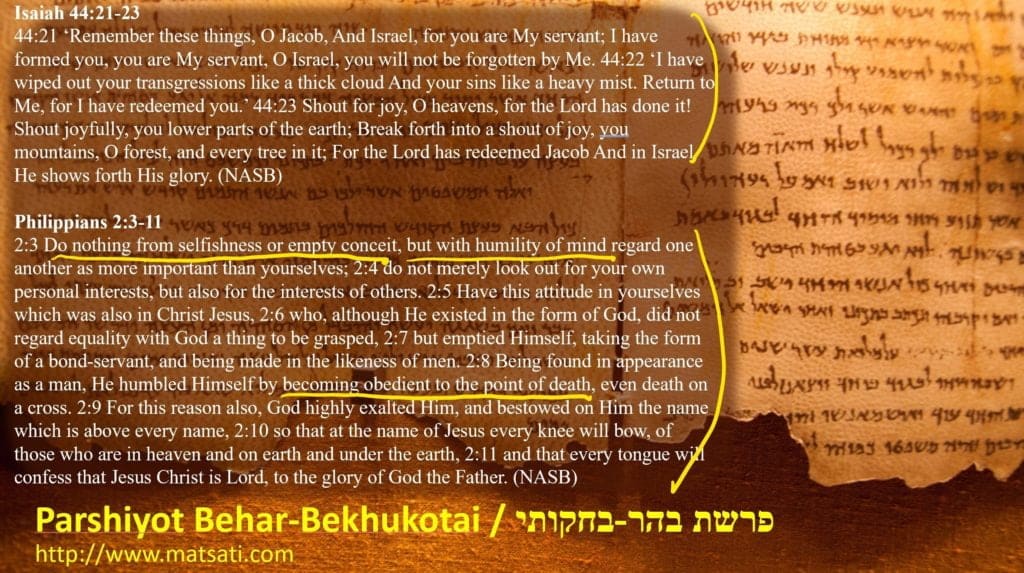
This week’s Torah portion draws out for us all of these things, in relation to God being a redeemer and savior of our souls. As we had discussed in previous studies, there are spiritual counterparts to the things that exist in this life. Being in debt, selling one’s home, one’s property, and even one’s own soul (nefesh) into slavery to pay off a debt, the spiritual counterpart is to the indebtedness of our souls to God due to our sins! Everything we have is a gift from God, even the breath in our lungs. Remember how we are told according to Bereshit / Genesis 1:27, we are created after the image of God. As following Torah, God sent into this world a redeemer who was fashioned in the form of a man. It is because of these things as the reason why Paul wrote what he did according to Philippians 2:3-11.
Philippians 2:3-11
2:3 Do nothing from selfishness or empty conceit, but with humility of mind regard one another as more important than yourselves; 2:4 do not merely look out for your own personal interests, but also for the interests of others. 2:5 Have this attitude in yourselves which was also in Christ Jesus, 2:6 who, although He existed in the form of God, did not regard equality with God a thing to be grasped, 2:7 but emptied Himself, taking the form of a bond-servant, and being made in the likeness of men. 2:8 Being found in appearance as a man, He humbled Himself by becoming obedient to the point of death, even death on a cross. 2:9 For this reason also, God highly exalted Him, and bestowed on Him the name which is above every name, 2:10 so that at the name of Jesus every knee will bow, of those who are in heaven and on earth and under the earth, 2:11 and that every tongue will confess that Jesus Christ is Lord, to the glory of God the Father. (NASB)
Note how everything Paul writes here is consistent with Torah, and specifically with this week’s Torah portion that speaks about the redeemer, being sold into slavery, and being set free by the power of God. We have redemption in and through Yeshua, and it was God Himself who was doing this. Paul writes how we are not to do things out of selfish conceit or personal interests. This is exactly what we are studying here in the sense that we are not to judge others and of the near kinsman having mercy delivering his brother. The idea of the bond-servant is compared to the one who needed to sell himself into slavery, and Yeshua is the one who redeems us from the debt that we have. Having been made in the form of a man, he is able to remove our sins, something which has weightier significance as compared sacrificial beasts (lamb, bull, ram). This is how the author of Hebrews reasons from a Torah perspective on the effective work of the Messiah. Based upon this week’s Torah commentary, He (Yeshua) become our redeemer, our savior, and our Lord, all of which is consistent with the Torah command!
